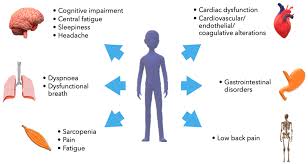A Persistent Challenge
The World Health Organization (WHO) has recently issued comprehensive guidelines on managing long COVID symptoms, shedding light on the persistent challenges faced by individuals experiencing prolonged effects of the virus. As the world continues to grapple with the aftermath of the COVID-19 pandemic, understanding and addressing long COVID has become a top priority for healthcare professionals and policymakers alike.
1. Defining Long COVID
Long COVID, also known as post-acute sequelae of SARS-CoV-2 infection (PASC), refers to the lingering symptoms experienced by individuals weeks or even months after recovering from the acute phase of COVID-19. These symptoms can vary widely and may affect multiple organ systems, including the respiratory, cardiovascular, neurological, and psychological systems.
2. Common Symptoms
While the symptoms of long COVID can vary from person to person, some of the most commonly reported ones include:
- Persistent fatigue
- Shortness of breath
- Brain fog or cognitive difficulties
- Joint pain
- Chest pain
- Palpitations
- Depression or anxiety
WHO Guidelines on Managing Long COVID
1. Multidisciplinary Approach
The WHO emphasizes the importance of a multidisciplinary approach to managing long COVID, involving healthcare professionals from various specialties, including primary care physicians, pulmonologists, cardiologists, neurologists, psychiatrists, and rehabilitation specialists.
2. Comprehensive Assessment
Healthcare providers are advised to conduct a comprehensive assessment of patients with long COVID symptoms, including medical history, physical examination, laboratory tests, and diagnostic imaging as needed. This holistic approach helps identify underlying health conditions and tailor treatment plans accordingly.
3. Symptom Management
Treatment for long COVID focuses on symptom management and supportive care to improve patients’ quality of life. This may include:
- Medications to alleviate specific symptoms, such as pain relievers for joint pain or antidepressants for depression and anxiety.
- Pulmonary rehabilitation for individuals experiencing persistent respiratory symptoms.
- Cognitive rehabilitation for those struggling with cognitive difficulties.
- Psychological support and counseling for mental health issues.
A Call to Action
As the global community continues to navigate the complexities of the COVID-19 pandemic, addressing the long-term effects of the virus is paramount. The WHO’s guidelines on managing long COVID symptoms provide valuable insights and recommendations for healthcare professionals, policymakers, and individuals affected by this challenging condition.




